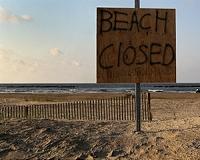| . |  |
. |
Venice, Louisiana (AFP) May 23, 2010 Anger mounted Sunday as heavy oil blackened Louisiana's marshes and beaches and efforts to cap the oil which has gushed into the Gulf of Mexico for more than a month ran into more delays. Initially scheduled to begin on Sunday, BP's latest attempt to plug a leak in a ruptured pipe 5,000 feet (1,500 meters) below the surface, the "top kill", is not expected to get under way until Tuesday at the earliest. As crews used robotic submarines to position equipment to inject heavy drilling fluids into the well and then seal it with cement, the amount of oil being suctioned up by a mile-long insertion tube slowed to 1,360 barrels a day from the previous average of about 2,100. "It really depends largely on the mix between oil and gas," BP spokesman Graham MacEwan told AFP. "It's not a constant flow so it will fluctuate over time." And while a fleet of skimmers did its best to contain the huge slick which has spread across the Gulf and begun to creep towards Florida, oil washed past protective booms, sullying miles of Louisiana's coastline. "Everybody is angry because they want to see action," said Susan Villiers, 52, who has three fishing boats sitting idle at Grand Isle, Louisiana because of the spill. "They want to see boats deploying booms and nothing's happening." Even at the lowest estimates, more than six million gallons of crude have entered Gulf waters since the BP-operated Deepwater Horizon rig sank on April 22, two days after an explosion that claimed 11 workers' lives. Right-wing darling Sarah Palin, who championed off-shore oil drilling in Alaska, accused President Barack Obama of lax oversight and a cozy relationship with the oil industry. "I don't know why the question isn't asked by the mainstream media and by others if there's any connection with the contributions made to President Obama and his administration and the support by the oil companies to the administration," Palin told Fox News. White House spokesman Robert Gibbs mocked Palin, noting that the Obama administration certainly did not make friends with the industry when it proposed a windfall profits tax. "BP will pay for every bit of this," Gibbs told CBS News. Obama hinted for the first time Saturday that a criminal investigation could be launched as he unveiled a presidential commission aimed at probing the "root causes" of the spill and recommending ways to improve regulation and ensure this "never happens again." He acknowledged concerns about the "cozy relationship between oil and gas companies and agencies that regulate them" and insisted all those responsible would be held accountable. Some 1,100 vessels, over 24,900 personnel and more than two million feet of protective boom have been deployed so far by BP and federal, state and local agencies. They have recovered over 9.7 million gallons of oily water so far. BP says it has already spent over 700 million dollars on the cleanup. But for parts of the Gulf Coast's fragile ecosystem, it was all too little, too late. Billy Nungesser was afraid oil-coated grasses in the marshes of his coastal parish would soon die, meaning there would be nothing to stop the rich soil from getting washed out to sea by the Mississippi. "We're not doing the right thing," the Plaquemines Parish president told AFP. "The president, the (Army) Corps (of Engineers), the Coast Guard, BP --- nobody. We've got God and we've got luck and that's about it." In another setback, authorities dealing with the spill say that so-called hair booms were insufficiently effective at soaking up the oil and asked people not to use them. "One problem with the hair boom is that it became waterlogged and sank within a short period of time," explained Charlie Henry, scientific support coordinator for the National Oceanic and Atmospheric Administration. More than 275 miles (443 kilometers) of containment boom have been deployed to limit the spill, and another approximately 370,000 feet (113 kilometers) of containment boom are available. Just how much oil is still gushing from the rig's wreckage has been a major point of contention, with BP initially putting the figure at 5,000 barrels, or 210,000 gallons, a day. Independent experts have estimated that the flow from the two leaks could be as high as 120,000 barrels per day. It will take at least two months for relief wells to be completed and hopes of stopping the flow are currently pinned on the "top kill" operation.
Share This Article With Planet Earth
Related Links Our Polluted World and Cleaning It Up
 As US beach closes, BP denies botched oil clean-up
As US beach closes, BP denies botched oil clean-upGrand Isle, Louisiana (AFP) May 22, 2010 A popular tourist beach in Louisiana remained closed due to oil contamination Saturday as BP officials denied botching the month-long clean-up and deliberately hiding the true extent of the spill. As Grand Isle, Louisiana, closed its seven-mile beach to clean up an orange-liquidy slick washing ashore, the British energy giant once again postponed an operation aimed at permanently stopping th ... read more |
|
| The content herein, unless otherwise known to be public domain, are Copyright 1995-2010 - SpaceDaily. AFP and UPI Wire Stories are copyright Agence France-Presse and United Press International. ESA Portal Reports are copyright European Space Agency. All NASA sourced material is public domain. Additional copyrights may apply in whole or part to other bona fide parties. Advertising does not imply endorsement,agreement or approval of any opinions, statements or information provided by SpaceDaily on any Web page published or hosted by SpaceDaily. Privacy Statement |